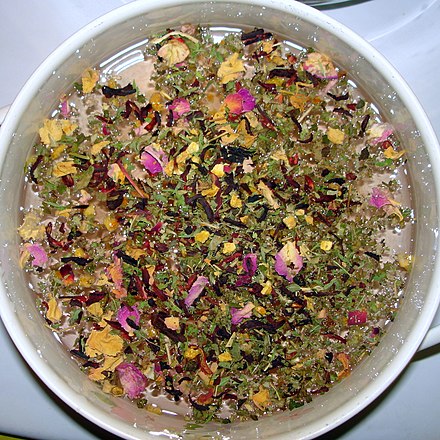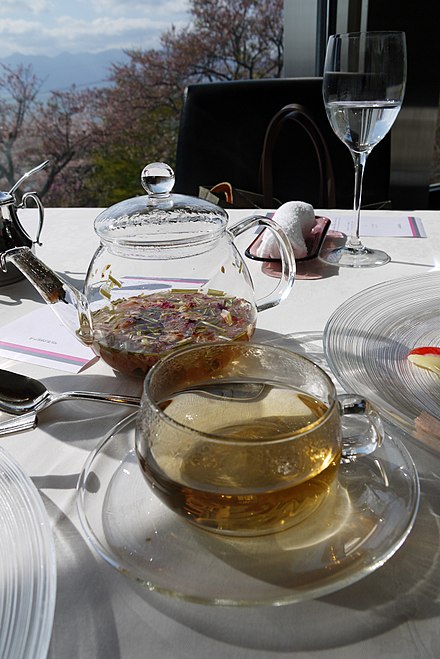Herbal tea
Herbal teas also known as herbal infusions—and less commonly[2] called tisanes (UK and US /tɪˈzæn/, US also /tɪˈzɑːn/)[3]—are beverages made from the infusion or decoction of herbs, spices, or other plant material in hot water. Oftentimes herb tea, or the plain term tea is used as a reference to all sorts of herbal teas. Some herbal blends contain actual tea.
The term "herbal" tea is often used in contrast to the so-called true teas (e.g., black, green, white, yellow, oolong), which are prepared from the cured leaves of the tea plant, Camellia sinensis. Unlike true teas (which are also available decaffeinated), most tisanes do not naturally contain caffeine.[4][5] There are a number of plants, however, that do contain caffeine or another stimulant, like theobromine, cocaine or ephedrine. Some common infusions have specific names such as coffee, mate (yerba mate), and rooibos (Aspalathus linearis).
Some feel[clarification needed] that the term tisane is more correct than herbal tea or that the latter is even misleading, but most dictionaries record that the word tea is also used to refer to other plants beside the tea plant and to beverages made from these other plants.[6][7] In any case, the term herbal tea is very well established and much more common than tisane.[2]
The word tisane was rare in its modern sense before the 20th century, when it was borrowed in the modern sense from French. (This is why some people feel it should be pronounced /tɪˈzɑːn/ as in French, but the original English pronunciation /tɪˈzæn/ continues to be more common in US English and especially in UK English).[3]
The word had already existed in late Middle English in the sense of "medicinal drink" and had already been borrowed from French (Old French). The Old French word came from the Latin word ptisana, which came from the Ancient Greek word πτισάνη (ptisánē), which meant "peeled" barley, in other words pearl barley, and a drink made from this that is similar to modern barley water.[8]
Herbal teas can be made with fresh or dried flowers, fruit, leaves, seeds or roots. They are made by pouring boiling water over the plant parts and letting them steep for a few minutes. The herbal tea is then strained, sweetened if desired, and served. Many companies produce herbal tea bags for such infusions.

